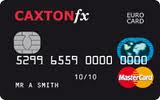We’ve been using a pre-paid , or “front-loaded”, currency card (it’s a Caxton MasterCard) for over a year now, and found it very convenient.
However we recently encountered a problem when using it in hotels.
A brief explanation for people unfamiliar with this type of card. Prepaid currency cards are ideal if you want to make sure you don’t overspend when abroad. These debit cards offer good foreign exchange rates, and are available to everyone (without credit checks).
We use the card to pay for meals and other smaller purchases in the local currency, without a commission fee. By putting a certain amount on the card before we set off, we always know we have funds available, and are spared visits to ATMs. It also helps us to easily keep track of foreign expenditure, by maintaining one dedicated account.
We generally load ours with several hundred pounds when we leave for a short trip. (You can also top them up online, although you may not want to do this from abroad through a public computer.)
Caxton, for example, waives ATM fees on both its global and euro/dollar cards, and it doesn’t apply any overseas charges when you use it outside the UK.
However, on a trip to the US recently, when trying to use the card, we discovered it had been mysteriously depleted. Or so it seemed. But on our return we couldn’t find any illegal activity on the card.
The same thing happened on a trip in Europe – I shan’t name the five star hotel, because they were otherwise very generous and helpful towards us. And, I suspect this is common practice in hotels.
On this three day trip we found our prepaid currency card once again being rejected on the first night. We naturally feared fraud, but were a bit confused when it was then accepted for a smaller transaction.
Then it was rejected once again, and we had to use a credit card to settle those various transactions. We contacted Caxton on our return to find out why our card was so suddenly depleted. This was the reason.
When we checked into the hotel – we were staying as their guests, in conjunction with a travel article I was writing – we presented the card to be scanned in the normal way to cover incidentals. It transpires that, without telling us, the hotel took around £290 from it to cover any pretty hefty bar and room service bills we might incur.
This did not show up as a transaction when we looked at our account online, and to add injury to the embarrassment of having the card rejected elsewhere, Caxton told us it could take two weeks for the money to find its way back into our account.
It’s possible that staff do not recognize a prepaid currency card, which looks exactly like a normal MasterCard. They might not, but the computer they use ought to recognize it as a debit card with possibly limited funds, prompting the staff member to ask if the guests would prefer to pay by credit card. (We could have done that.)
There are many advantages to using a prepaid currency card. You can keep tabs on what you’re spending. With ours, you don’t incur transaction charges. And if your wallet is stolen, the thief can only take funds out to the limit you have previously set, which makes it a better security risk than a credit card.
It is certainly something we plan to continue to use. Now it’s up to hotels, in particular, to make sure their staff recognise this type of card, and their computer software alerts them when they don’t. I think customers should be told on presenting a prepaid currency card that such a big sum will be taken out, and offer the chance to pay with a credit card instead.
This is the hotel’s e-mail to me:
“I have looked into what happened and it seems that the hotel took a credit approval for 300€ (which is normal procedure for a credit card). Unfortunately as yours was not a credit card the whole amount was removed from your account.
“When you checked out the bill was paid with your card. The remaining amount was released by the hotel [the next day].
“We will be checking more closely to ensure that the guests are aware of this procedure and are offered the chance to give a credit card and to ensure that no-one else has the same problem that you encountered.”
[The payment (bar bill) was €35. We knew we wouldn’t be spending much, which is why we use that card. it was accepted somewhere else later because there was enough money left on the account for that small transaction]

